

GMO honey. By Daniel Wiser, Attune Foods, Director of Marketing Honey is a pretty natural thing.
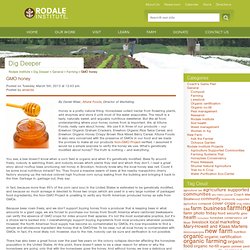
Honeybees collect nectar from flowering plants, add enzymes and store it until most of the water evaporates. The result is a tasty, naturally sweet, and arguably nutritious sweetener. But like all food, understanding where your honey comes from is important. We, at Attune Foods, really care about honey. You see, a bee doesn’t know when a corn field is organic and when it’s genetically modified. In fact, because more than 95% of the corn (and soy) in the United States is estimated to be genetically modified, and because so much acreage is devoted to those two crops (which are used in a very large number of packaged food ingredients), the Non-GMO Project is unwilling to verify any North American produced honey as safe from GMOs. There has also been a great focus over the past few years on the colony collapse disorder affecting the honeybee population in the United States.
EU bans GM-contaminated honey from general sale. The European Union's highest court on Tuesday ruled that honey which contains trace amounts of pollen from genetically modified (GM) corn must be labelled as GM produce and undergo full safety authorisation before it can be sold as food.
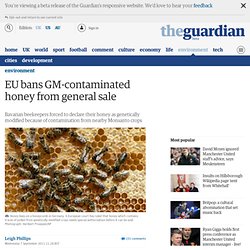
In what green groups are calling a "groundbreaking" ruling, the decision could force the EU to strengthen its already near-zero tolerance policy on genetically modified organisms (GMOs). Bavarian beekeepers, some 500m from a test field for a modified maize crop developed by Monsanto - one of only two GM crops authorised as safe to be cultivated in Europe - claimed their honey had been "contaminated" by pollen from the plant.
When Organic Isn't Really Organic. When you buy a gallon of organic milk, you expect to get tasty milk from happy cows who haven't been subjected to antibiotics, hormones or pesticides.
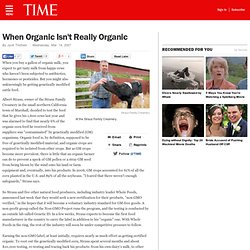
But you might also unknowingly be getting genetically modified cattle feed. Albert Straus, owner of the Straus Family Creamery in the small northern California town of Marshall, decided to test the feed that he gives his 1,600 cows last year and was alarmed to find that nearly 6% of the organic corn feed he received from suppliers was "contaminated" by genetically modified (GM) organisms. Organic food is, by definition, supposed to be free of genetically modified material, and organic crops are required to be isolated from other crops. But as GM crops become more prevalent, there is little that an organic farmer can do to prevent a speck of GM pollen or a stray GM seed from being blown by the wind onto his land or farm equipment and, eventually, into his products. Government to ignore European ban on neonicotinoid pesticides - Green Living - Environment. Herman Fontier, head of the pesticides division of the European Food Safety Authority (EFSA), told a Parliamentary committee that his organisation’s recommendation two weeks ago that neonicotinoid pesticides, widely blamed for bee declines around the world, should be kept away from bees, was merely a risk assessment – and it was up to individual EU member states whether or not to act on it.
In Britain the Environment Secretary, Owen Patterson, has already indicated that the Government is likely to ignore the recommendation and is opposed to an immediate ban on three neonicotinoids highlighted by the EFSA report, imidacloprid, clothianidin and thiamethoxam, made by the giant agribusiness companies Bayer and Syngenta. Mr Patterson’s Department for Environment, Food and Rural Affairs (Defra) is carrying out its own research into neonicotinoids and bees. Neonicotinoids. The neonicotinoids are a class of insecticides with a common mode of action that affects the central nervous system of insects.
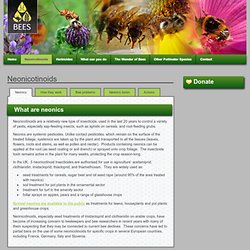
They bind to receptors of the enzyme nicotinic acetylcholine, causing excitation of the nerves, leading to eventual paralysis and death. This specific neural pathway is more abundant in insects than warm-blooded animals, so these insecticides are selectively more toxic to insects than mammals. Bees have a particular genetic vulnerability to neonics because they have more of these receptors than other insects, as well as more learning and memory genes for their highly evolved system of social communication and organisation, Unlike many insect pest species which are able to detoxify harmful chemicals, bees possess fewer genes for detoxification. While the older organophosphate and carbamate insecticides tend to degrade quite rapidly in the environment, neonics are more persistent. Bee-harming pesticides escape proposed European ban. A European attempt to ban the world's most widely used insecticides that have been linked to serious harm in bees has failed.
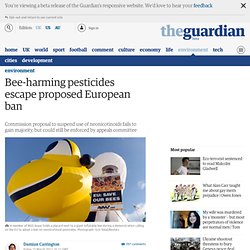
The European commission proposed a two-year suspension of neonicotinoids after the European Food Safety Authority (EFSA) deemed their use an unacceptable risk, but major nations including UK and Germany failed to back the plan in a vote on Friday. The result leaves environmental campaigners, scientists and some politicians bitterly disappointed.
"Britain and Germany have caved in to the industry lobby and refused to ban bee-killing pesticides," said Iain Keith, at campaign group Avaaz. "Today's vote flies in the face of science and public opinion and maintains the disastrous chemical armageddon on bees, which are critical for the future of our food. " The chemical companies that dominate the billion-dollar neonicotinoid market, Bayer and Syngenta, were relieved. The same "hung" vote at the appeals committee would mean the EC could enforce the ban. 20 questions on genetically modified foods. Tiere haben Rechte. Genetic modification (GM) Genetic modification (GM) is a biotechnology that is being used to make new products, in particular new types of crop plant.

In global terms the use of GM crops has increased steadily since the first commercial plantings in North America in the late 1990s. By 2012 over 17 million farmers in 28 countries were growing GM crops on 170 million hectares, which is more than 12% of the world’s arable land.